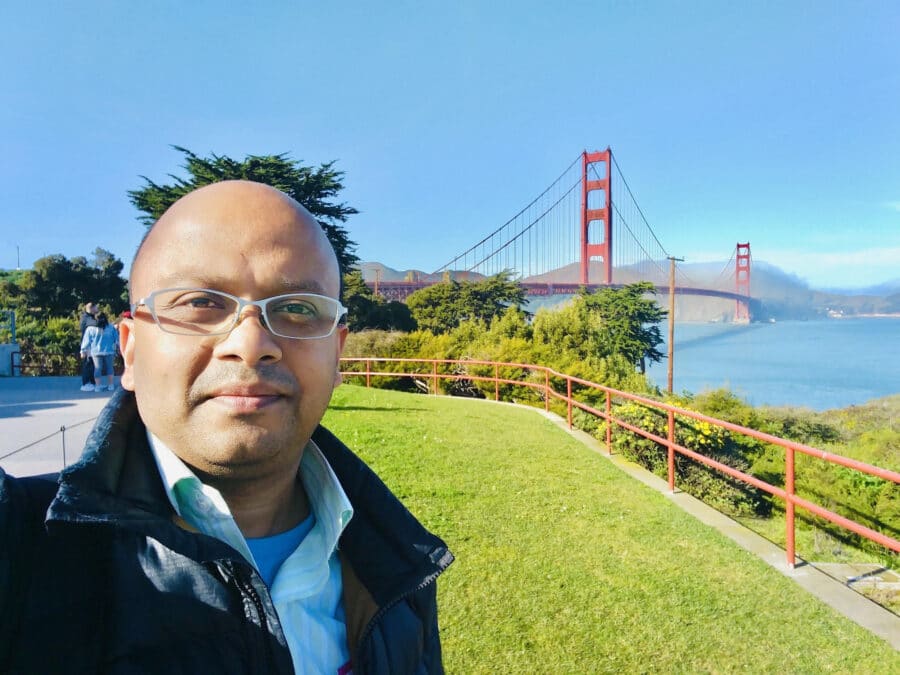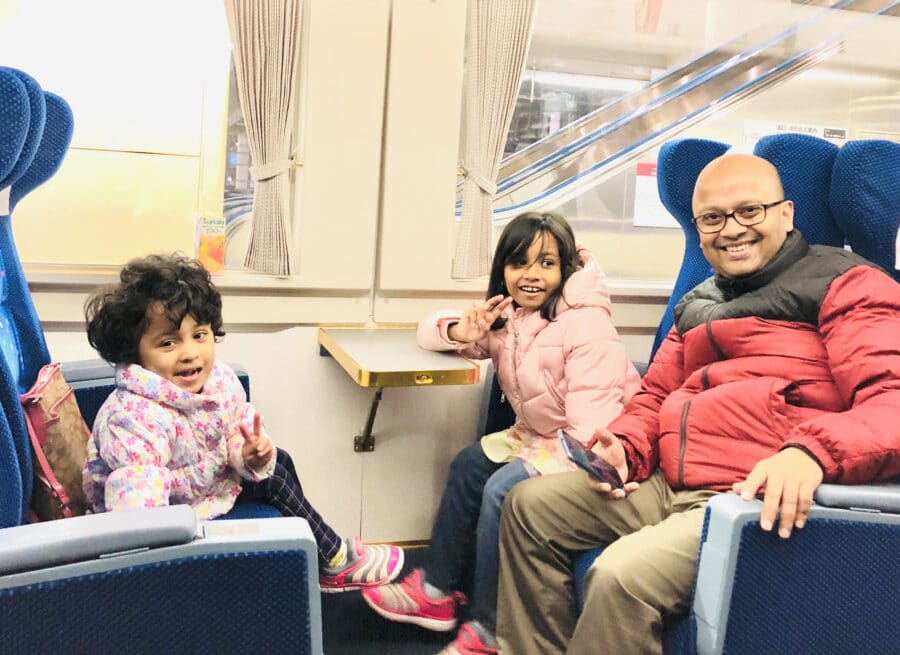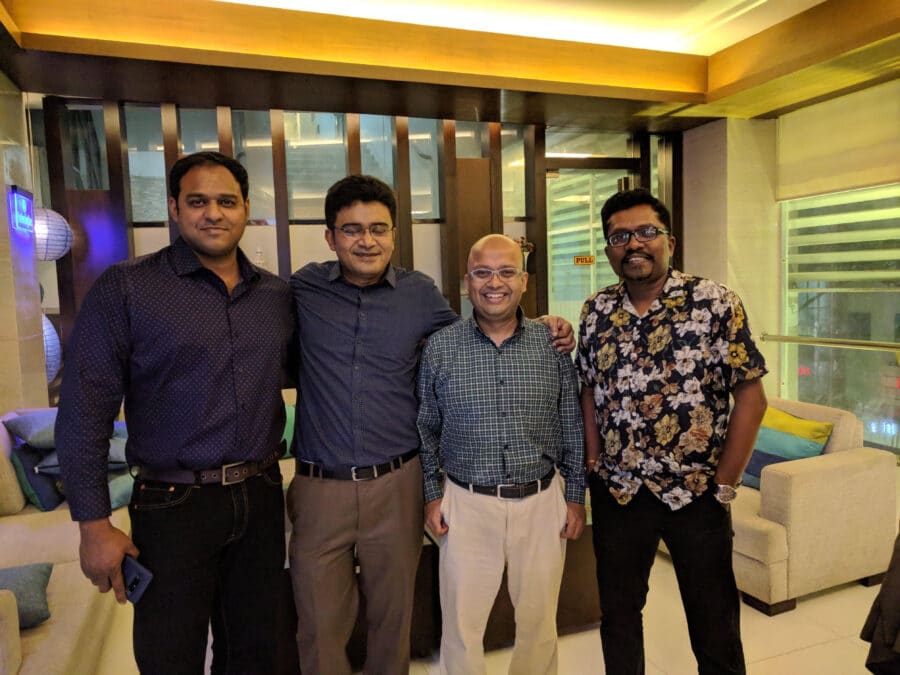Mohammad Muquit is a former MEXT scholar from Bangladesh. He studied at the University of Tohoku in Sendai and then moved to Tokyo to work in R&D for Sony. He now works as a consultant for MathWorks, helping companies introduce MATLAB into their projects.
*This article has been edited from the original interview for brevity and clarity.
Applying for the scholarship
When did you come to Japan?
I came in April 1996.
How did you find out about the scholarship?
The Japanese embassy in my country has some circulars in local newspapers. At the time when I was close to graduating from high school, I was interested in going overseas. I wanted to study in the US, Australia or Japan, developed countries because they have better facilities. Luckily, I found the circular of the Japanese embassy where the scholarship was mentioned, so I applied and got the scholarship.
Do you remember how many people applied at the same time as you did?
Not exactly. We applied through the Ministry of Education, they first do filtering. I remember the filter downsized to 25 people who could sit for the test at the Japanese embassy.
How many people were granted the undergraduate scholarship?
We were two, and there were more people who got other scholarships.
Did you know any Japanese before coming to Japan?
No (laughs). Just some greetings.
CJLC days
During your first year, you attended CJCL at Osaka University (Osaka University of Foreign Studies at the time). Back then, did they also split the scholars between Osaka and Tokyo?
Yes, we were 80 undergraduate students in Osaka and a bit less, about 70, in Tokyo.
At that time, there were not many privately funded students, but I think that number is increasing now.
In CJLC, we were divided into different classes depending on our Japanese ability.
What classes did you take there besides Japanese language classes?
I was a science major, so I took Physics, Chemistry and Math, as well as Nihon Jijou (Japanese affairs).
Overall how was the experience in Osaka for you?
Minoh is a beautiful place. Life was excellent, I would say. When we were there, there was one dormitory for foreign students and 3-4 dormitories for Japanese students, so we had a lot of opportunities to interact with Japanese students. They used to come to our dorm to chat and play games; it was good for us to practice our Japanese, and good for them to practice their English. When I was there, it wasn’t part of Osaka University, it was part of Osaka University of Foreign Studies, so, all the Japanese students there were studying foreign languages. I remember there was a department teaching my language (Bengali), so those students would come to talk to us.
They had really good facilities: we had a cafeteria on the first floor of our dorm, so you could also eat there. And our dorm was close to where we took our classes, so life was very convenient. The only hard part were the math and physics classes, the Japanese style of studying those sciences was very different from my country, so it was very difficult for me. I was very shocked. Other than that, it was fun, I enjoyed my time there a lot. The teachers were very caring about us. I especially liked the Japanese language classes. I took Japanese classes at my university as well, but they were totally different. In Osaka, they were interactive, the teachers were really good, but in university, the teaching style was more formal: the teachers would give a lecture and you’d have to follow up by yourself.

University of Tokoku days
Which university did you go to after Osaka?
I went to Tohoku University, to the campus is in Sendai.
How was the transition from Osaka to Sendai?
It’s quite far. I got prepared for living in a very cold place but fortunately, I didn’t find it that much different from Osaka. Of course, it’s colder than Osaka, but not that much. I think I saw snow once or twice when I was in Osaka, and in Sendai, it was about 7 to 8 times a year. The good thing was that Sendai is a rather compact city, so you can easily walk from the campus to your home without having to take the train. All your friends also live within walking distance, so that was very nice too. In Tokyo for example, when I want to visit my friends, I usually have to take the train. Whenever I go to a party, I always needed to think of the last train. I didn’t need to think about that in Sendai.
Sendai sounds very nice. How were the classes at university? I assume all of them were in Japanese?
Yes, they were all in Japanese. Honestly, it was very tough for me. I found it very difficult to follow, not that much because of language but because of the contents. So maybe the style of teaching was not the best for me. I was very much used to interactive classes, but the university was totally different: every week you would have a lecture and that was it. Maybe after 10-12 lectures, there would be an assignment, and those were also very difficult, couldn’t really relate them to the course contents. It was tough for me to follow, and the tests were also very difficult.
How did you overcome that?
Eventually, I had to make friends with my Japanese classmates and ask them a lot of things: about the assignments, the tests. The worst thing was that I didn’t have many senpai so I couldn’t get any help from them.
After 3 years, you get assigned to a lab, how was that for you?
The lab I got assigned to was called “Information Physics”, they do crazy things. I was working on neural networks: predicting an event based on previous data. My research was about golf: predict whether the ball was going to fall into the hole or not based on the speed, the air, etc. It was not theoretical research, but it was very practical. My professor retired when I finished undergrad, so I changed labs for Masters (I extended the scholarship). That one was also very practical; we did image processing, more specifically 3D measurement using two cameras. That kind of measurement is usually done with lasers, and that equipment is very expensive; our goal was to find a way to do the same with cameras and to replace expensive lasers.
Did you continue to PhD after masters?
Yes, I got funding from KDDI for one year (it’s a scholarship aimed at international students), and I also got another good scholarship from The Watanuki Foundation.
Working at Sony
What did you do after your PhD?
You know in Japan, you start searching for a job in your final year of school. So I did the same and luckily I got an offer from Sony so I joined them right after finishing my PhD.
Was that in Tokyo?
Yes, in Shinagawa.
So you had to move from Sendai to Tokyo for work, how was that change?
That had a big impact on me. I had a lot of friends in Sendai, and also it is a very homey city, and Tokyo is totally different: you’re busy 5 days of the week, just come to the office, work, go back home, get ready for the next day. It was very different from my life in Sendai. It was a bit of a shock for me. Back in university, I would spend the whole day in the lab but I wasn’t working all the time: you can take time to go for a coffee, have a chat with your lab mates, your friends, we even played video games sometimes. At work, the first three months, you’re not allowed to do overtime because it’s the training period. So after 6, it was like “what should I do?”. But I got married the next year and then it became better because I now have my family to come home to.

How was working at Sony? Was it what you were expecting it to be?
It was very nice. I was in the R&D department and luckily the things I did in Sony were very close to my research in university, I learned a lot. In university, we do some practical things but not on the same scale as you do when you work, so I learned that in Sony. I think the work environment in Sony is very good, more professional than the lab.
How long did you work at Sony?
I stayed there for five years.
Change of jobs and plans for the future
What made you want to change jobs? Were you looking for a different challenge?
I think I got tired of doing research. One of the problems with research is that when you start doing something is very fun but eventually you reach a point when things get saturated, you run out of ideas and sometimes you feel like there’s probably nothing more to do. I was in that situation, looking for the next thing to do and I thought it was a good time to start a new path. So my current job is consulting. I wanted to get involved in shorter projects, research project usually takes years, and I was advised to try consulting by the HR department at work. I now work in MathWorks and the product that I work with is called MATLAB, which is used by engineers, so luckily I had used it before when I was in the lab. I think it worked for me because I’m still there (laughs).
How long have you been working there?
It’s been 8 and a half years. I help clients introduce our product to their workflow, get involved in their projects and help them speed them up. Each project lasts less than one year, so I get to work on a lot of different projects.
You have experienced working over 10 years in Japan, has there ever been something that you particularly didn’t like? I think there are many scholars interested in continuing working in research after university, so it would be very helpful if you could tell me any differences you’ve noticed working at a lab at university and then at a company, and also if you have any insights about something that you feel is very particular to working on research in Japan.
I think companies are very focused but at university, you have more freedom: at a company you’re not allowed to do whatever you want, it should be aligned with their products or business. That being said, the environment at companies is more professional: at university, everything depends on you, so a lot of unexpected things can happen, also human relations can be a bit bad, this kind of things are well handled at companies: you get a well-structured work environment, but you have less freedom. So they both have pros and cons. One problem in Japanese entities however, even in company or lab, it’s the lack of communication, information is not shared openly. There is this culture thing that people expect that if I tell you A, you should understand everything up to Z. I’ve found that difficult for me at times. MathWorks is a North American company, so we have a different culture when it comes to sharing information and I find that very good and also highly motivating. All the information is available and well-shared, people don’t hesitate to share information and ask questions.

What are your plans for the future?
I like Japan, it’s a very convenient country. For example, I usually go to the US for company events, also some other countries, and I find it very difficult that you need a car to go places. Also in those places, everything is calm and quiet after the evening but Japan is very lively. In Tokyo, or even Sendai, everything is around you: convenience stores, coffee shops, anything, so life is very easy here. There’s only one reason why I would move somewhere else and that’s my kids: I want them to learn English so maybe I would move somewhere else so that they can learn that as well. In terms of my career, I would like to continue expanding my expertise in the field that I am working in right now.
Thank you so much for your time. Lastly, I would like to ask you for some advice for the kouhai.
My first advice is to enjoy Japan, travel within the country as much as you can, do homestay, try to interact with the locals as much as possible. If you’re in Tokyo, I would recommend you to try all the different countries’ foods. And secondly, as for your career, I can only talk about engineering but, if you’re an undergrad student, I would suggest you to focus on brushing up your programming skills, because those will never be unnecessary.

